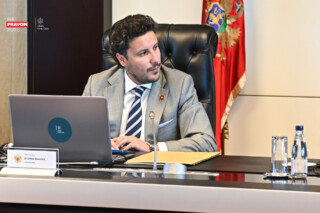Legal and institutional framework, guaranteeing independence and impartiality of judicial branch, implies high level of responsibility of every holder of judicial function independently. It is reasonable that citizens want prosecutors and judges to uncompromisingly protect legal order of Montenegro as it is the only way to build trust in judicial organization, said vice-president of the Government and Minister of justice, Mr Zoran Pažin.
He pointed out at the conference of ministers of justice of WB countries that citizens’ concern over the overall success of reforms would raise if the responsibility of judicial system wasn’t increased.
“Therefore, judiciary is obliged to respond to the challenges duly and efficiently”, said Mr Pažin.
During the conference organized by the Ministry of Justice of Albania and Council on the Regional Cooperation, ministers of justice, high officials and experts in the field of rule of law from WB countries discussed key challenges in the achievement of European standards, improvement of rule of law and enhancement of regional judicial cooperation.
Mr Pažin pointed out that high level of independence carried with it a particular type of responsibility for impartial and independent actions of every prosecutor and judge.
Implementation of the previous judicial reform strategy significantly strengthened the independence of the Montenegrin judiciary and emphasized that further judicial reform remained a priority in Montenegro’s European integration process.
“Higher level of judicial efficiency is going to improve the quality of respect for human rights and rule of law, whereas enhancement of accessibility and transparency of judicial institutions should result in satisfactory level of trust in judicial system”, said Mr Pažin.
Mr Nikola B. Šaranović, director general of the Directorate for International Cooperation, delivered an address on the second expert panel dedicated to design.
He reminded that EU Council had stated that Montenegro’s institutional framework was complete and that legal framework had been established to a great extent.
Mr Šaranović emphasized the cooperation in the process of the implementation of temporary measures in chapters 23 and 24, judicial cooperation with countries in the region and participation of Montenegrin institutions in the work of European judicial networks.




